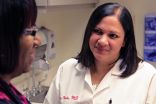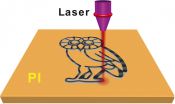German researchers propose better substances for treating the dengue virus
Potential new active substance has an effect even in very low concentrations
2014-12-10
(Press-News.org) Researchers from Johannes Gutenberg University Mainz (JGU) and the Julius Maximilian University of Würzburg are proposing potential new active substances for treating the dengue virus. Just like Ebola, dengue fever is also caused by a virus for which there is currently no cure and no vaccine and can be fatal.
In the quest for medication to treat the dengue virus, the scientific community is focusing on a particular enzyme of the pathogen, the protease known as NS2B/NS3. The reason for this is that inhibitors of similar proteases have been revealed to be very effective with other viruses. Protease inhibitors are already being used successfully in the treatment of HIV and Hepatitis patients. There are also several inhibitors for the dengue protease. However, at best, they stop only half of the viruses from multiplying, which is not enough for clinical applications. The Würzburg team led by virologist PD Dr. Jochen Bodem, in collaboration with scientists from Mainz University, has discovered far better inhibitors, which are now presented in the journal Antimicrobial Agents and Chemotherapy.
"We have developed seven good to very good inhibitors from the diaryl thioether class of molecules, and two of these are even really good," said Bodem. When these two are used, only around three percent of the virus population in a cell culture survives even with very low concentrations of the active substance. From the point of view of science, this is a very good result, especially as the inhibitors, as desired, are highly specialist: they only target dengue viruses and have no impact whatsoever on very close relatives like the Hepatitis C virus.
The new active substances were developed by a team of virologists and pharmacists. From Mainz, Professor Tanja Schirmeister and, in particular, her colleague Hongmei Wu, were involved. Schirmeister's team synthesized the inhibitors and then examined and further developed their interactions with the enzyme using computer-assisted methods. On Jochen Bodem's team, Stefanie Bock, who is now working towards a doctorate at the University of Münster, played a key role. Here the protease of the viruses was obtained and cleaned. The effect of the active substances on the dengue virus was later demonstrated in the safety laboratory. As a next step, the scientists will check whether the new active substances have negative effects on higher organisms and whether they inhibit viral replication there as well.
Dengue fever originated in the tropics. However, for a few years now it has also been found in other warm regions of the world, such as the Mediterranean. Scientists are attributing this to climate change: the mosquitoes that transmit the virus to humans are able to expand their habitat thanks to increasing global warming. Back in 2010, the Robert Koch Institute reported on dengue fever in southern France and Croatia. In Germany in 2013, there were a total of 879 recorded dengue patients - all travelers who had become infected in the southern hemisphere and in tropical countries. The World Health Organization (WHO) estimates that the number of infections globally stands at 390 million a year. In 1970, infections occurred in just nine countries. These days, that figure has already risen to over 100.
The virus is transmitted by the tiger mosquito and other mosquitoes. Usually the infection goes unnoticed since there are no signs of the disease in almost 90 percent of cases. In the remaining cases, an influenza-type illness develops, which may take a potentially fatal course, especially in children. In addition to muscle and bone pain accompanied by a high temperature for days, the patient then develops internal bleeding and other severe symptoms. Without intensive medical treatment, around half of these sufferers die. To date, there is no vaccine and no way of fighting the dengue virus with specific drugs. It is therefore recommended that measures be taken to protect against mosquito bites in countries where there is a risk of infection, such as covering the skin with clothes as much as possible, sleeping under a mosquito net, and applying mosquito-repellent creams.
INFORMATION:
Publication:
H. Wu et al., Novel Dengue virus NS2B/NS3 protease Inhibitors, Antimicrobial Agents and Chemotherapy, 8 December 2014,
DOI:10.1128/AAC.03543-14
Image:
http://www.uni-mainz.de/presse/bilder_presse/09_pharmazie_dengue.jpg
The interactions of the protease inhibitor (yellow) with the enzyme were analyzed using computer-assisted methods. (ill.: Hongmei Wu)
Contact:
Dr. Jochen Bodem
Institute of Virology and Immunobiology at the Julius Maximilian University of Würzburg
phone +49 931 31-81509
e-mail: jochen.bodem@vim.uni-wuerzburg.de
Prof. Dr. Tanja Schirmeister
Institute of Pharmaceutical Sciences and Biochemistry at Johannes Gutenberg University Mainz
phone +49 6131 39-25742
e-mail: schirmei@uni-mainz.de
ELSE PRESS RELEASES FROM THIS DATE:
2014-12-10
JACKSONVILLE, Fla. -- A marker of immune function that predicts for better outcomes in patients treated with chemotherapy for triple negative breast cancer is also linked to improved prognosis in patients treated with chemotherapy for HER2-positive breast cancer. But that marker -- the quantity of tumor-infiltrating lymphocytes (S-TILs) in a biopsy -- appears irrelevant when trastuzumab is used.
And since trastuzumab, and not chemotherapy alone, is the standard of care for the HER2-positive sub-class of breast cancer, there is no need to test for these lymphocytes in ...
2014-12-10
In patients with metastatic triple-negative breast cancer--a disease with no approved targeted therapies--infusion of pembrolizumab produced durable responses in almost one out of five patients enrolled in a phase-Ib clinical trial, according to data presented Dec. 10, at the 2014 San Antonio Breast Cancer Symposium.
The multi-center, non-randomized trial was designed to evaluate the safety, tolerability and antitumor activity of bi-weekly infusions of pembrolizumab (MK-3475, marketed as Keytruda®). The researchers enrolled 27 patients, aged 29 to 72 years, who had ...
2014-12-10
Several past studies have suggested that the magnetic fields created by phones, high-voltage power lines and other electrical equipment are harmful for humans.
Research first carried out in the 1970's and again subsequently, found an association between people living near overhead power lines and an increased risk of childhood leukaemia. Although some later studies have failed to find such a link, the International Agency for Research on Cancer has categorised low frequency magnetic fields as "possibly carcinogenic."
But a mechanism for this association has never been ...
2014-12-10
While many different combinations of genetic traits can cause autism, brains affected by autism share a pattern of ramped-up immune responses, an analysis of data from autopsied human brains reveals. The study, a collaborative effort between Johns Hopkins and the University of Alabama at Birmingham, included data from 72 autism and control brains. It will be published online Dec. 10 in the journal Nature Communications.
"There are many different ways of getting autism, but we found that they all have the same downstream effect," says Dan Arking, Ph.D. , an associate professor ...
2014-12-10
HOUSTON - (Dec. 10, 2014) - Researchers at Rice University have created flexible, patterned sheets of multilayer graphene from a cheap polymer by burning it with a computer-controlled laser. The process works in air at room temperature and eliminates the need for hot furnaces and controlled environments, and it makes graphene that may be suitable for electronics or energy storage.
Under a microscope, what the researchers call laser-induced graphene (LIG) doesn't look like a perfect chicken wire-like grid of atoms. Instead, it's a jumble of interconnected graphene flakes ...
2014-12-10
Phoenix, AZ (December 10th, 2014) - The brain responds differently to two kinds of sugar, according to a report today at the American College of Neuropsychopharmacology annual meeting in Phoenix Arizona. The study suggests that fructose heightens the response of brain reward circuits to food cues, promoting feeding behavior.
Currently, roughly two out of three U.S. adults are overweight and one out of three is obese. Changes in lifestyle and dietary intake during the past quarter century are thought to be the main culprits, with the increase in fructose consumption of ...
2014-12-10
PISCATAWAY, NJ - Communities with fewer places to buy or drink alcohol also tend to have lower rates of intimate partner violence, new evidence suggests.
The research, published in the January issue of the Journal of Studies on Alcohol and Drugs, suggests that laws limiting what is called "alcohol outlet density" could offer one way to address violence within intimate relationships.
States and communities throughout the United States have enacted various laws to reduce excessive use of alcohol, including limiting outlet density, limiting hours and days of sale, and ...
2014-12-10
The simple act of saving something, such as a file on a computer, may improve our memory for the information we encounter next, according to new research published in Psychological Science, a journal of the Association for Psychological Science. The research suggests that the act of saving helps to free up cognitive resources that can be used to remember new information.
Our findings show that people are significantly better at learning and remembering new information when they save previous information," says psychological scientist and study author Benjamin Storm of ...
2014-12-10
PITTSBURGH, Dec. 9, 2014 - A treatment pioneered at the University of Pittsburgh Center for Vaccine Research (CVR) is far more effective than traditional antibiotics at inhibiting the growth of drug-resistant bacteria, including so-called "superbugs" resistant to almost all existing antibiotics, which plague hospitals and nursing homes.
The findings, announced online in the journal Antimicrobial Agents and Chemotherapy and funded by the National Institutes of Health, provide a needed boost to the field of antibiotic development, which has been limited in the last four ...
2014-12-10
Berkeley -- A systematic overview of more than 100 studies comparing organic and conventional farming finds that the crop yields of organic agriculture are higher than previously thought. The study, conducted by researchers at the University of California, Berkeley, also found that certain practices could further shrink the productivity gap between organic crops and conventional farming.
The study, to be published online Wednesday, Dec. 10, in the Proceedings of the Royal Society B, tackles the lingering perception that organic farming, while offering an environmentally ...
LAST 30 PRESS RELEASES:
[Press-News.org] German researchers propose better substances for treating the dengue virus
Potential new active substance has an effect even in very low concentrations



